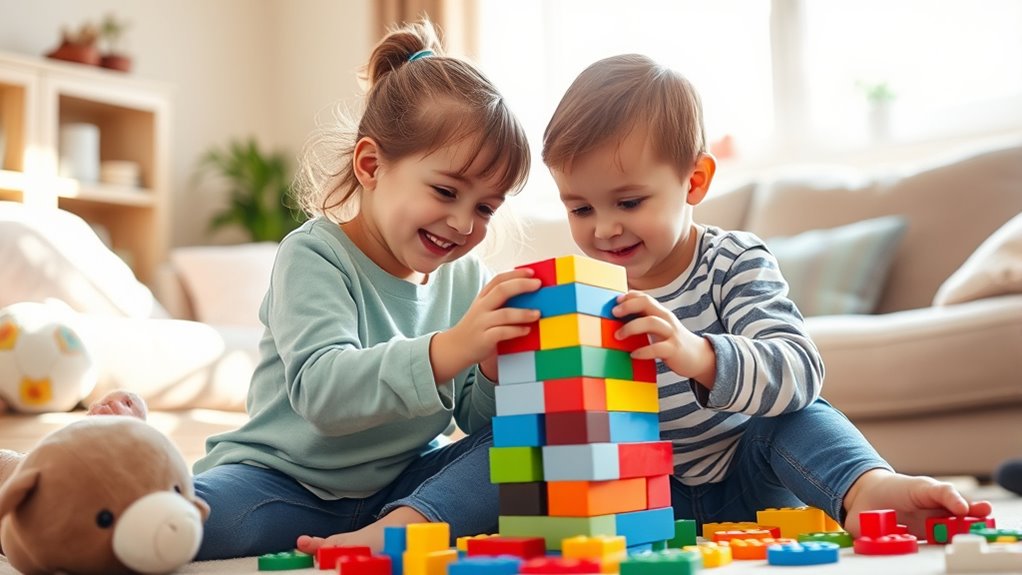To coach cooperation and reduce conflict during sibling play, start by modeling sharing and taking turns, praising positive interactions. Gently intervene when disagreements arise, encouraging your children to express their feelings and listen to each other. Teach conflict resolution skills like using calm words, offering solutions, and apologizing if needed. By guiding these interactions, you help your children develop essential social skills and emotional intelligence—skills that will benefit them well into the future.
Key Takeaways
- Model sharing behaviors and encourage taking turns to promote cooperation during sibling play.
- Teach children specific phrases and skills for expressing feelings and resolving disagreements calmly.
- Guide siblings to listen to each other’s perspectives and practice empathy to reduce conflicts.
- Reinforce positive interactions with praise to encourage continued cooperative behavior.
- Intervene gently during conflicts, helping children find mutually acceptable solutions and develop conflict resolution skills.

Have you ever wondered why sibling play is so essential for childhood development? It’s because through playing together, children learn vital social skills like sharing strategies and conflict resolution. When your kids engage in play, they’re not just having fun—they’re practicing how to cooperate, negotiate, and navigate disagreements. These interactions lay the foundation for healthy relationships later in life. As a parent or caregiver, guiding your children through these moments can make a significant difference in how they develop emotional intelligence and empathy.
One way to foster positive sibling interactions is by teaching effective sharing strategies. Sharing isn’t always natural for young children, but you can help them understand its importance by modeling and encouraging specific behaviors. Show them how to take turns, distribute toys fairly, and express their needs without hostility. For example, when two kids want the same toy, instead of letting conflict escalate, suggest taking turns or playing with the toy together. Reinforce this behavior with praise, highlighting how sharing makes playtime more enjoyable for everyone. Over time, your children will learn that sharing isn’t just about giving up something temporarily but about building trust and cooperation.
Conflict resolution is another critical skill that children develop through sibling play. Disagreements will happen—it’s inevitable—and that’s okay. What matters most is how they handle those conflicts. When you notice tension brewing, step in gently and guide your children towards resolving their issues calmly. Encourage them to express their feelings clearly and listen to their sibling’s perspective. Teach them phrases like, “I feel upset when you take my toy,” or “Can we find a different game to play?” This helps them develop language skills that are crucial for resolving conflicts peacefully. Your role is to facilitate understanding and help them find mutually acceptable solutions. This might mean suggesting compromises or encouraging apologies and forgiveness.
Frequently Asked Questions
How Can Parents Effectively Mediate Sibling Disagreements?
You can effectively mediate sibling disagreements by staying calm and guiding your children through conflict resolution. Model positive behavior and demonstrate how to express feelings calmly. Encourage them to listen to each other’s perspectives and find common ground. Your role modeling shows how to handle disagreements constructively. By facilitating open communication and teaching conflict resolution skills, you help your kids develop healthier relationships and reduce ongoing disputes.
What Are the Best Activities to Promote Cooperation?
You can promote cooperation by engaging in team building activities and collaborative games. Try puzzles, building projects, or relay races that require teamwork. These activities encourage your children to communicate, share ideas, and work towards a common goal. Make sure to praise their efforts and emphasize the importance of cooperation. Over time, these experiences help siblings develop stronger bonds, learn patience, and enjoy working together more naturally.
How Does Age Difference Affect Sibling Play Dynamics?
Age gaps influence sibling play, shaping unique play styles and dynamics. When there’s a small age difference, you might notice more mutual movement and shared interests, fostering friendship. Larger gaps can lead to differing play styles, with younger siblings often mimicking older ones or seeking simpler activities. Understanding these age-appropriate activities helps you tailor interactions, encouraging cooperation and reducing conflicts, making playtime more pleasurable for everyone involved.
When Should Parents Intervene in Sibling Conflicts?
You should intervene in sibling conflicts when rivalry escalates beyond mild disagreements or when feelings get hurt. Use parenting strategies that teach conflict resolution skills instead of immediate punishment. Your goal is to promote cooperation and understanding, not suppress sibling rivalry. By stepping in at the right moments, you help your children learn how to handle disagreements constructively, fostering healthier sibling relationships and reducing long-term conflicts.
How Can Siblings Be Encouraged to Share and Take Turns?
Research shows that establishing sharing boundaries and implementing turn-taking strategies fosters cooperation among siblings. You can encourage them by setting clear rules about sharing and taking turns, then consistently reinforcing these boundaries. Use visual cues or timers to help siblings understand when it’s their turn, making the process predictable. Praising efforts and patience encourages positive behavior, helping siblings naturally develop skills in sharing and taking turns, reducing conflicts over time.
Conclusion
Think of sibling relationships as a garden. With coaching cooperation, you nurture the flowers, helping them grow strong and vibrant. When you reduce conflicts, weeds are kept at bay, allowing harmony to flourish. Your active involvement acts like sunlight, guiding your siblings toward positive play and understanding. By tending this garden with patience and care, you create a space where sibling bonds blossom beautifully, turning everyday interactions into a lush, thriving landscape of cooperation and friendship.










